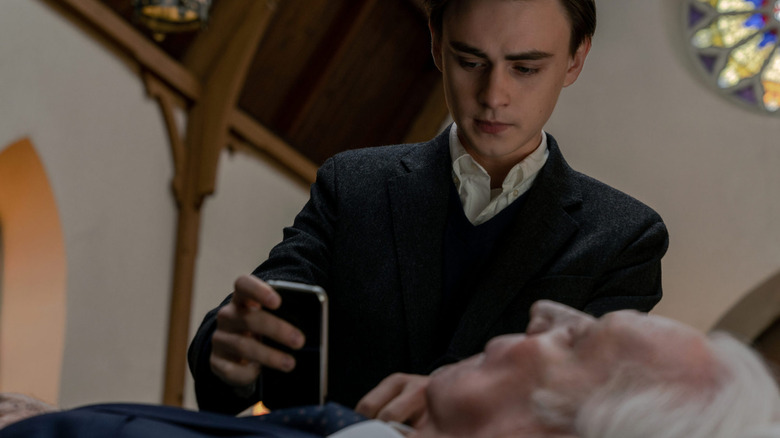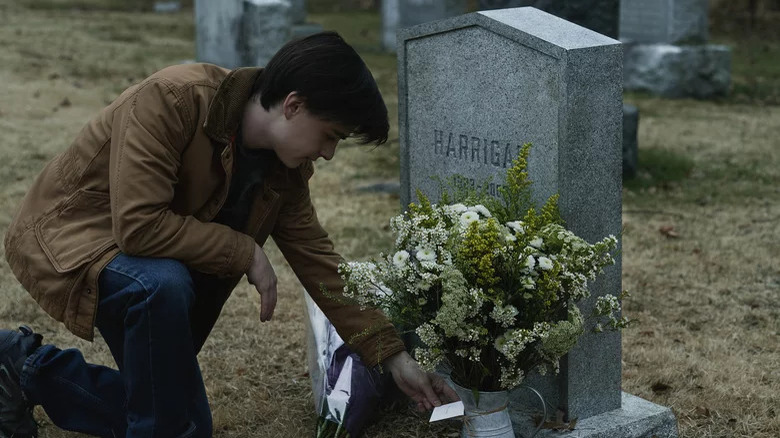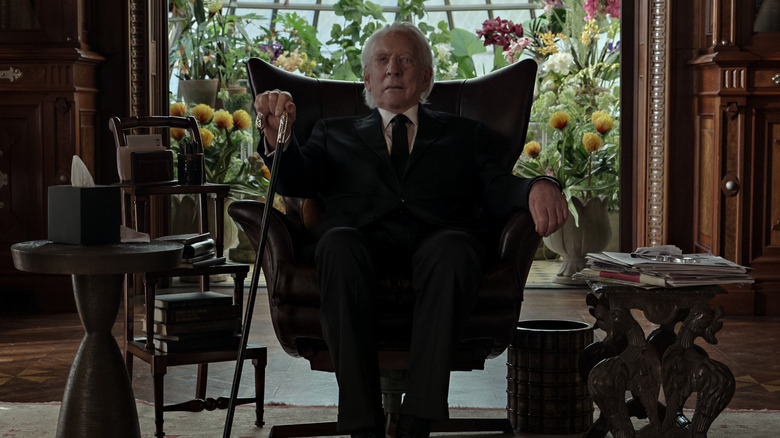Mr. Harrigan's Phone Director John Lee Hancock Only Had Donald Sutherland In Mind For Mr. Harrigan [Exclusive Interview]
In writer-director John Lee Hancock's film "Mr. Harrigan's Phone," the latest Stephen King adaptation, we find a young man named Craig (Jaeden Martell) building a friendship with a rather unexpected individual. Originally hired to read to the wealthy and aging John Harrigan (Donald Sutherland), the unlikely duo become a pair of unconventional pals. Craig finds himself able to buy the elderly Harrigan an early-era smartphone, enabling the two to stay in touch. But when Harrigan dies unexpectedly, Craig discovers that texting Mr. Harrigan's phone gives him seeming contact with the dead, and telling Harrigan someone's wronged him mysteriously results in his enemies turning up dead.
"Mr. Harrigan's Phone" is John Lee Hancock's first foray into the horror space as a director, and the film is a wonderfully shot supernatural yarn featuring strong central performances by Martell and Sutherland (you can catch our full review here). I spoke with John Lee Hancock about the choices that went into developing his approach to the adaptation, getting Donald Sutherland on board, managing the need for Stephen King's approval, and more.
'I thought of it as a paranormal coming-of-age'
You've directed many genres, and this is your first horror film. Why the pivot?
Hancock: I didn't think of it [as] that much of a pivot because, when I read it, I didn't think of it as a true King horror. I thought about it more like "The Body" or "Stand By Me" or "[The] Shawshank [Redemption]," and I thought of it as a paranormal coming-of-age. I'm very drawn to character and coming-of-age stories and things like that, so there were just themes in it that drew me to it that I thought ... it is something that I haven't done before, but it didn't feel like a complete left turn. It felt very character-motivated, and I was really drawn to these characters and the different themes that Stephen was illuminating.
There's a lovely mournful ghost story vibe to it. What inspired or influenced your approach?
Hancock: The fact that this is, in some ways, a small story with universal themes, and you're going to be in this small fictitious town of Maine, it was [necessary to find] ways to tell the story that embrace the universality of it but also make it uneasy and creepy. John Schwartzman, my DP, and myself talked a lot about lens selection, and also where to put the camera sometimes. I didn't mind negative space in a frame just to make it feel a little off. Not so much that you go, "That's a bad shot." You go, "That's interesting, hmm." It just seeps into you a little bit.
Also, [we used] some very gentle movement that you feel more than see. We [also] talked a lot about, for instance, "Rosemary's Baby," which is an ordinary story. I mean ordinary in a great way. It's a seemingly ordinary world until she has Satan's baby, there's that, but everything about it, the way it was shot, was so beautifully done that sometimes it would just be a little off. A little too low. "Why are we that low?" And it just creates an uneasiness which we were trying to emulate.
'It's Stephen King, and you want approval'
What was the process of adapting this like?
Hancock: It's the first novella I've adapted, and it was difficult because you realize going in its 80-something pages. You're going to have to [expand] on that to make it a movie, and they're different mediums. Knowing that, you're going to hopefully embrace Stephen's themes all the more aggressively in hopes that you can create something from those themes that activates, and feels more like a story that you're seeing instead of just reading and hearing. It's a specific challenge, and it was difficult for me just because ... it's Stephen King, and you want approval, but you also know that you have to make it a movie and [yet] you still want Stephen King's approval.
Donald Sutherland is such a legend. Tell me about getting him on board, and what was it like working with him?
Hancock: I normally don't think about actors when I'm reading a book, or even when I'm writing a script necessarily, because sometimes there's a journey of understanding that you go through when you're writing that starts to prompt you to think about certain actors by the time you're finished. I never would be up front going "I think this is this person," but this is an exception, because when I was reading Stephen King's novella, the words that he put coming out of Mr. Harrigan's mouth, it was Donald's voice in my ear. I said, "Gosh, don't retire yet. Donald. Don't retire yet." He was my first and only choice, and thankfully he said yes. He told me, "I believe this character is closer to me than any character I've ever played," and I said, "Wow. Okay. That's interesting."
"Mr. Harrigan's Phone" is now available to stream on Netflix.


